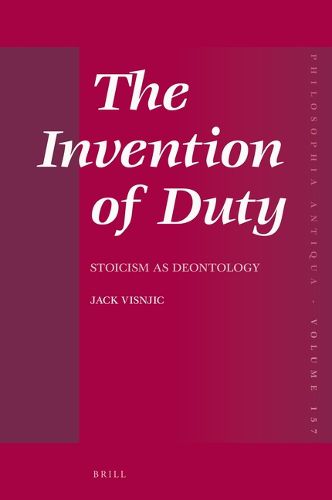Readings Newsletter
Become a Readings Member to make your shopping experience even easier.
Sign in or sign up for free!
You’re not far away from qualifying for FREE standard shipping within Australia
You’ve qualified for FREE standard shipping within Australia
The cart is loading…






Did the ancient Greeks and Romans have a concept of moral duty? Jack Visnjic seeks to settle this long-standing controversy in The Invention of Duty: Stoicism as Deontology. According to the prevailing view, ancient ethical systems lacked any sense of moral obligation and were built instead around notions of virtue and human flourishing. Visnjic argues that, millennia before Kant, the Stoics already developed a robust notion of moral duty as well as a sophisticated deontological ethics. While most writings of the Stoics perished, their concept of duty lived on and eventually came to influence the modern notion. In fact, there are strong indications that Kant’s formulation of a new duty-based morality was inspired by his encounter with Stoic ideas.
I found Visnjic’s account of Stoic ethics rich and stimulating […]. I am now converted to the view that one ought to think of Stoic kathekonta as duties rather than merely appropriate courses of action and I am grateful to Visnjic for pushing this point.
-John Sellars, Royal Holloway, University of London, Bryn Mawr Classical Review (July 2021)
$9.00 standard shipping within Australia
FREE standard shipping within Australia for orders over $100.00
Express & International shipping calculated at checkout
Did the ancient Greeks and Romans have a concept of moral duty? Jack Visnjic seeks to settle this long-standing controversy in The Invention of Duty: Stoicism as Deontology. According to the prevailing view, ancient ethical systems lacked any sense of moral obligation and were built instead around notions of virtue and human flourishing. Visnjic argues that, millennia before Kant, the Stoics already developed a robust notion of moral duty as well as a sophisticated deontological ethics. While most writings of the Stoics perished, their concept of duty lived on and eventually came to influence the modern notion. In fact, there are strong indications that Kant’s formulation of a new duty-based morality was inspired by his encounter with Stoic ideas.
I found Visnjic’s account of Stoic ethics rich and stimulating […]. I am now converted to the view that one ought to think of Stoic kathekonta as duties rather than merely appropriate courses of action and I am grateful to Visnjic for pushing this point.
-John Sellars, Royal Holloway, University of London, Bryn Mawr Classical Review (July 2021)